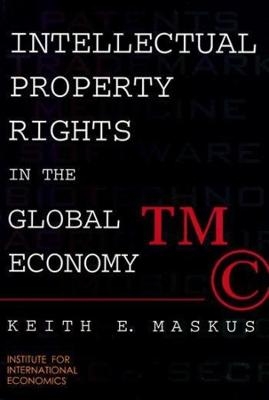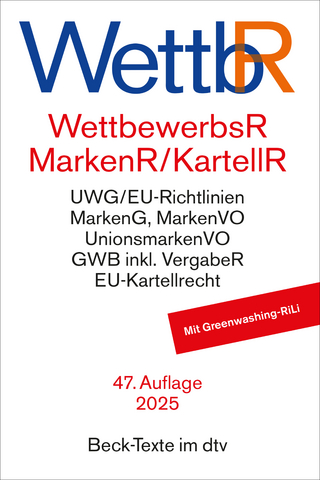
Intellectual Property Rights in the Global Economy
Seiten
2000
The Peterson Institute for International Economics (Verlag)
978-0-88132-282-8 (ISBN)
The Peterson Institute for International Economics (Verlag)
978-0-88132-282-8 (ISBN)
- Lieferbar (Termin unbekannt)
- Portofrei ab CHF 40
- Auch auf Rechnung
- Artikel merken
During the 1980s and 1990s, intellctual property rights (IPRs) were strengthened in many countries. This study examines the claims of both advocates and opponents of this policy, analyzing the economic effects of extended international protection and partial harmonization of IPRs.
Over the past 15 years, intellectual property rights (IPRs)-patents, copyrights, and trademarks-have moved from an arcane area of legal analysis and a policy backwater to the forefront of global economic policymaking. In the 1990s dozens of countries unilaterally strengthened their laws and regulations in this area, and many others are poised to do likewise. At the multilateral level, the successful conclusion of the Agreement on Trade-Related Aspects of Intellectual Property Rights (TRIPs) in the World Trade Organization elevates the protection and enforcement of IPRs to the level of solemn international commitment. The new global IPR system comes with both benefits and costs. Stronger IPRs protection should increase incentives for innovation and raise returns to international technology transfer. However, it also could raise the costs of acquiring new technology and products, shifting the global terms of trade in favor of technology producers and against technology consumers.
In this context, the new regime raises international economic policy questions that evoke impassioned and exaggerated claims from both advocates and opponents of IPRs, particularly concerning sensitive issues such as patent protection of pharmaceuticals and biotechnological inventions, and copyright protection for internet transactions. In the first comprehensive economic assessment of the effects of stronger international IPRs, Keith E. Maskus examines these competing claims through an analysis of the economic effects of extended international protection and partial harmonization of IPRs. He presents findings on the potential effects of stronger global IPRs, including likely impacts on foreign direct investment, technology transfer, and pricing under enhanced market power. The results bear directly on several important policy questions, including the construction of complementary initiatives on market liberalization and competition rules, and Maskus discusses whether priority attention should be devoted to them in the upcoming next round of global trade talks.
Over the past 15 years, intellectual property rights (IPRs)-patents, copyrights, and trademarks-have moved from an arcane area of legal analysis and a policy backwater to the forefront of global economic policymaking. In the 1990s dozens of countries unilaterally strengthened their laws and regulations in this area, and many others are poised to do likewise. At the multilateral level, the successful conclusion of the Agreement on Trade-Related Aspects of Intellectual Property Rights (TRIPs) in the World Trade Organization elevates the protection and enforcement of IPRs to the level of solemn international commitment. The new global IPR system comes with both benefits and costs. Stronger IPRs protection should increase incentives for innovation and raise returns to international technology transfer. However, it also could raise the costs of acquiring new technology and products, shifting the global terms of trade in favor of technology producers and against technology consumers.
In this context, the new regime raises international economic policy questions that evoke impassioned and exaggerated claims from both advocates and opponents of IPRs, particularly concerning sensitive issues such as patent protection of pharmaceuticals and biotechnological inventions, and copyright protection for internet transactions. In the first comprehensive economic assessment of the effects of stronger international IPRs, Keith E. Maskus examines these competing claims through an analysis of the economic effects of extended international protection and partial harmonization of IPRs. He presents findings on the potential effects of stronger global IPRs, including likely impacts on foreign direct investment, technology transfer, and pricing under enhanced market power. The results bear directly on several important policy questions, including the construction of complementary initiatives on market liberalization and competition rules, and Maskus discusses whether priority attention should be devoted to them in the upcoming next round of global trade talks.
Keith E. Maskus, visiting fellow at the Peterson Institute for International Economics, is professor of economics and associate dean for social sciences at the University of Colorado, Boulder. He is also a fellow at the Kiel Institute for World Economics and an adjunct professor at the University of Adelaide. He is author of Private Rights and Public Problems: The Global Economics of Intellectual Property in the 21st Century (2012).
| Verlagsort | Washington |
|---|---|
| Sprache | englisch |
| Maße | 152 x 227 mm |
| Gewicht | 440 g |
| Themenwelt | Recht / Steuern ► EU / Internationales Recht |
| Recht / Steuern ► Wirtschaftsrecht ► Urheberrecht | |
| Wirtschaft ► Volkswirtschaftslehre ► Makroökonomie | |
| ISBN-10 | 0-88132-282-2 / 0881322822 |
| ISBN-13 | 978-0-88132-282-8 / 9780881322828 |
| Zustand | Neuware |
| Haben Sie eine Frage zum Produkt? |
Mehr entdecken
aus dem Bereich
aus dem Bereich
Gesetz gegen den unlauteren Wettbewerb, Preisangabenverordnung, …
Buch | Softcover (2024)
dtv Verlagsgesellschaft
CHF 23,65
Textausgabe zum deutschen, europäischen und internationalen Patent-, …
Buch | Softcover (2023)
dtv Verlagsgesellschaft
CHF 24,95


